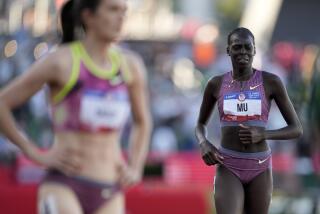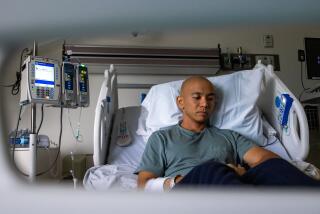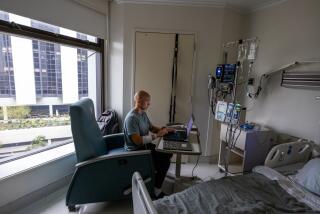Student’s Death Gives New Life to Bone Marrow Drive
- Share via
VENTURA — Katalina Um’s story was one of optimism and luck. The 22-year-old student, suffering from cancer, breezily predicted she would conquer the disease consuming her body. And when she beat overwhelming odds last month to find a suitable bone-marrow donor, those closest to her held their breath.
But Um never got to receive the bone marrow transplant, her best shot at regaining health. She died Sunday of leukemia.
Um was a good Samaritan who fed her city’s homeless and recently launched a drive to increase minority enrollment in a national registry of potential bone marrow donors.
She had been euphoric in October because a suitable match for her bone marrow had been identified through the National Marrow Donor Program.
But doctors sent her home Nov. 6 when it became clear that grueling rounds of chemotherapy would not halt her particularly aggressive form of leukemia, said her boyfriend, Tony Litoff. Without remission, doctors told her, there was no chance for the transplant to work.
Litoff and two other friends are planning to continue Um’s work toward increasing enrollment in the national marrow program. The committee will meet this week to decide what methods the organization will use to reach blacks, Latinos and Asians, said Anita Young, who befriended Um after reading about her plight.
Sharon Sugiyama of the Los Angeles-based Asians for Miracle Marrow Matches, said Tuesday that news of Um’s death was a blow to her and her staff.
In the past two months, Um and a group of friends had worked closely with Sugiyama’s group to increase the number of minorities enrolled in the National Marrow Donor Program.
“Those who had worked on the project were so taken by her because she had so much spirit and was so positive,” Sugiyama said.
Um, a native of Korea, launched the campaign after learning that minority registration lags far behind the number of whites enrolled in the program. Ethnicity is a prime factor in finding marrow matches, but just 4% of the 951,000 potential donors listed in the registry are of Asian descent, Sugiyama said.
“Her death just makes us work harder,” Sugiyama said.
More to Read
Sign up for Essential California
The most important California stories and recommendations in your inbox every morning.
You may occasionally receive promotional content from the Los Angeles Times.













